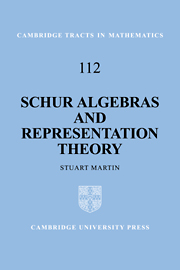Book contents
- Front matter
- Contents
- Introduction
- 1 Polynomial functions and combinatorics
- 2 The Schur algebra
- 3 Representation theory of the Schur algebra
- 4 Schur functors and the symmetric group
- 5 Block theory
- 6 The q-Schur algebra
- 7 Representation theory of Sq(n, r)
- Appendix: a review of algebraic groups
- References
- Index of Notation
- Index of Terms
5 - Block theory
Published online by Cambridge University Press: 22 September 2009
- Front matter
- Contents
- Introduction
- 1 Polynomial functions and combinatorics
- 2 The Schur algebra
- 3 Representation theory of the Schur algebra
- 4 Schur functors and the symmetric group
- 5 Block theory
- 6 The q-Schur algebra
- 7 Representation theory of Sq(n, r)
- Appendix: a review of algebraic groups
- References
- Index of Notation
- Index of Terms
Summary
We have seen in 3.5 and 4.4 that Brauer's theory of modular reduction for finite groups has analogues both for GLn(K) and for the Schur algebras. Another important ingredient in Brauer's modular theory is the notion of a block. Since block decompositions exist for any finite-dimensional algebra, it is natural to seek an understanding of the blocks of the Schur algebras. In the light of our study of Schur functors, there is enough evidence to suspect that the answer may have something to do with the block decomposition of symmetric groups and of general linear groups.
Let us make the assumption, valid throughout Chapter 5, that K is algebraically closed. Now a block decomposition of KG induces a block decomposition of E⊗r, and hence a block decomposition of S(n, r) = EndKG(E⊗r). The reader may recall that the blocks of G are described by the combinatorial rule stated originally by Nakayama. In his paper, Donkin [1987, (2.12)] demonstrated that the same rule applied provided r ≤ n. It took another five years for the case r > n to be completed— here a modified version of Nakayama's rule holds. The proof given below is based on Donkin [1992], which in turn is based on the determination of the blocks of a semisimple simply connected affine algebraic group (Donkin [1980]).
The proof is lengthy, though the techniques are simple enough. We concentrate on those Γ-blocks that ‘look like’ G-blocks and show that the Nakayama rule holds for them.
- Type
- Chapter
- Information
- Schur Algebras and Representation Theory , pp. 130 - 158Publisher: Cambridge University PressPrint publication year: 1994



